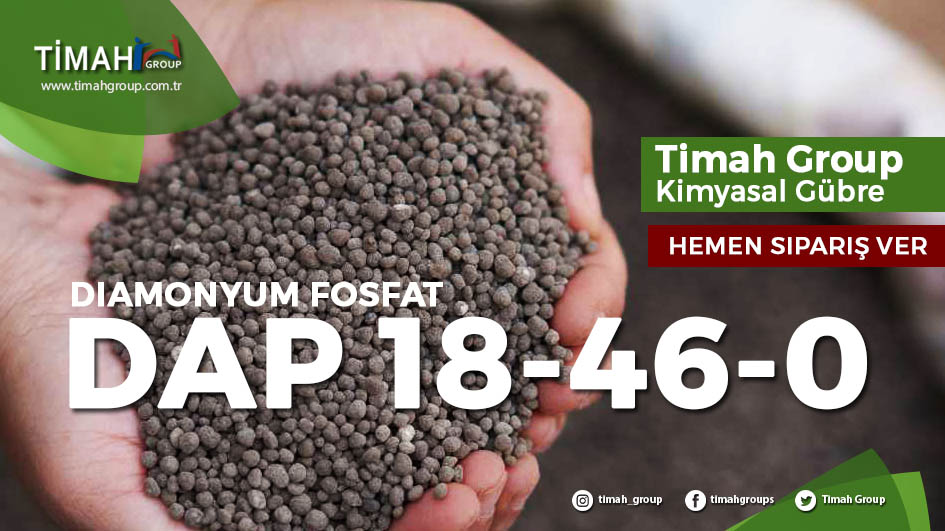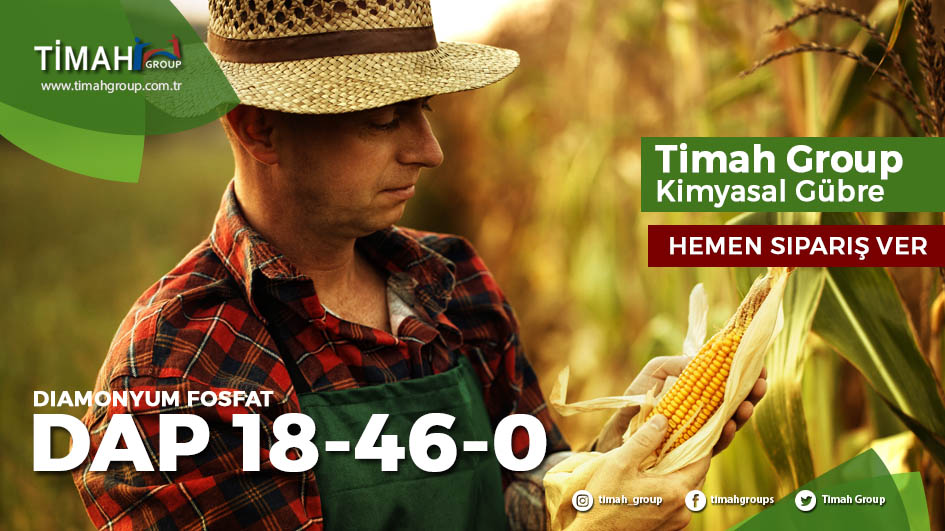What is the Content of Diammonium Phosphate (DAP 18-46-0) Fertilizer?
- 18% Nitrogen (N)
- 46% Phosphorus (P2O5)
What is DAP Fertilizer?
DAP fertilizer is a water-soluble product available in granular or powder form. It is one of the main essential inputs for farmers in Turkey, known for its easy storage and high efficiency. Due to the water-solubility of most of the phosphorus and the ammonium form of nitrogen, DAP becomes readily available for use in the soil once the appropriate conditions (temperature, humidity) are met.
Considering its content, crops like wheat, oats, barley, corn, and other cereals benefit the most from DAP 18-46-0. Additionally, it's used for crops such as cotton, sunflower, rice, onions, alfalfa, sugar beet, olives, and peanuts.

Due to its high phosphorus content, DAP fertilizer accelerates root development in the early growth stages of plants and strengthens the root system. It promotes flowering and increases grain and fruit set. In addition to ensuring high yields, DAP fertilizer enhances color formation in fruits and vegetables, provides high tolerance to extreme cold and drought, improves resistance to diseases and pests, and extends shelf life. It also boosts the aroma and flavor of products while increasing their vitamin content. A deficiency in phosphorus can lead to a decrease in both the quantity and quality of the crop. However, in soils with high nitrogen requirements, it may be necessary to use other types of fertilizers alongside DAP.
When using DAP 18-46-0, it is crucial to determine the correct application timing. If applied too early, the phosphorus may combine with the lime in the soil, rendering it ineffective. Conversely, if applied too late, the phosphorus may remain on the soil surface and provide no benefit to the plant. Therefore, it should be applied with or before planting/sowing, either at the seed or root depth. For crops to be planted in spring, it is suitable to bury the fertilizer 10-15 cm deep right before planting.
What is Diammonium Phosphate (DAP 18-46-0) Used For?
DAP fertilizer is used during the planting of crops and vegetables. It is particularly unsuitable for application after the seeds have germinated. For cereals (such as wheat and barley), DAP is an appropriate fertilizer to enhance yield and should be applied at seed depth during planting. For fruit trees, it is recommended to apply DAP between February and March, with a dosage of 15 kg per decare (approximately 1,000 square meters). It can be used for all types of plants. For crops planted in the spring, DAP should be buried 10-15 cm deep in the soil right before planting.
It is widely preferred in Central Anatolia, especially in soils with a significant phosphorus deficiency. It is important to note that DAP fertilizer should not be broadcasted (spread evenly over the surface); instead, it should be applied in furrows or rows (banded application).

What Are the Benefits of Diammonium Phosphate (DAP)?
- DAP promotes root formation and early growth in plants.
- It improves the quality of the crops we cultivate.
- It prevents grain shedding in plants and ensures the grains are plump.
- DAP enhances plant resistance to diseases.
- It increases the plant's tolerance to drought and strengthens it, leading to higher yields in crops.
How Much DAP 18-46-0 Should Be Applied?
When considering the use of DAP 18-46-0 as a base fertilizer, you must account for the crop type and soil analysis. The amount of DAP 18-46-0 required varies depending on the crop and the results of the soil test.
For example, if the soil analysis indicates a phosphorus requirement of 3 kg, you can multiply this by 2.2, resulting in 6.6 kg. Therefore, 6.6 kg of DAP 18-46-0 can be applied per decare (1,000 square meters).
How Much DAP 18-46-0 to Apply Based on Crop Type (Per Decare)?
- Wheat: 13 to 21 kg per decare.
- Barley: 9 to 14 kg per decare.
- Grain or Silage Corn (on medium to heavy soils): 23 to 37 kg per decare.
- Cotton: 10 to 15 kg per decare.
- Rice (on potassium-rich soils): 15 to 22 kg per decare.
- Peanuts (on light to medium soils): 13 to 18 kg per decare.
- Garlic: 10 to 15 kg per decare.
- Onions: 16 to 22 kg per decare.
- Alfalfa: 35 kg per decare.
- Soybeans (on heavy soils): 13 to 18 kg per decare.
It is essential to conduct a soil analysis before using DAP 18-46-0. If possible, it is recommended to apply the fertilizer using the band method with a seed drill. If a seed drill is unavailable, although not ideal, broadcasting the fertilizer can be done, but you must ensure it is fully mixed into the soil. For fruit trees, the fertilizer can be applied based on the tree’s canopy spread, and in drip irrigation systems, it should be allowed to reach the roots. In the case of olive and vineyard fertilization, well-rotted animal manure is often used alongside DAP 18-46-0, and zinc sulfate or potassium sulfate may also be added when needed.
The dissolution rate of DAP 18-46-0 depends on the soil structure, rainfall, soil fertility, weight, and lime content. When applied correctly and in proper doses, the fertilizer can show rapid effects on seeds or seedlings, delivering the desired yield.